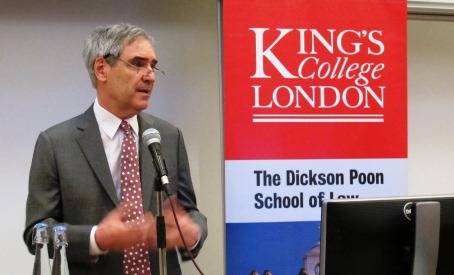Professor Michael Ignatieff speaks at King's

Michael Ignatieff gave a public lecture on ‘Legality, Legitimacy & Intervention After Ukraine’ at The Dickson Poon School of Law on 17 March 2014. Among the 150 attendees were renowned King’s Law Faculty such as Professors Thomas Pogge, Jospeh Raz and Thomas Campbell - as well as many students from across the College.
Professor Ignatieff is a celebrated academic, author, public intellectual, columnist and former politician. He was a member of the Canadian Parliament and the Head of the Liberal Party.
In his talk, Ignatieff explained the tensions arising in deliberation over international intervention between the demands of international law, democratic consent for intervention and the moral imperatives to come to the aid of the helpless. According to Ignatieff, it is impossible to fully satisfy all these demands and the West must reflect on how to negotiate between these competing imperatives when faced with tragedies of the kind currently experienced in Syria and possibly unfolding in the Ukraine.
Dr Ori Herstein introduced Professor Ignatieff by saying that ’Ignatieff is a writer of great skill, eloquence, insight and brilliance.’ And pointed out two main themes that run through much of Ignatieff’s work: ‘The first is a deep fidelity to the spirit liberalism’, he said, ‘In Ignatieff’s work there is a profound understanding and care for The Individual as well as concern for protecting individuals from oppression. Moreover, Ignatieff is not a man of dogmas, ready to question even entrenched liberal tenets. In this, he is a true student of Mill, who taught us to always doubt moral authorities, and that even our deepest and most fervent convictions must always be tested against the ever-changing scenery of society. We do so not only to fend of error, but also because that only through on-going examination can we truly embrace complexity, and maintain what Mill calls a “livelier impression of truth” avoiding sinking into dogmatism. A second theme Ignatieff seems deeply occupied with is the relation between individuals and collectives and in the ties that bind us together. He writes of families and of nations, and of exile, statelessness, refugees, patriotism, nationalism, immigration, acceptance, loneliness, homelessness and belonging.’
Professor Ignatieff visited the School as a guest of the KJuris group.
About KJuris ‘KJuris’ represents the many and varied activities, centres, programs, and individuals engaged in jurisprudence, legal theory, and related moral and social philosophy at King’s. Led by scholars of The Dickson Poon of Law, the KJuris community is made up of members with specialty in law, as well as other King’s departments including Philosophy and Political Economy. This makes the KJuris community exceptionally rich and diverse, drawing on more than one intellectual tradition. What unites its members is a passion for theory, criticism, and reflection on the law.
See forthcoming events from The Dickson Poon School of Law.